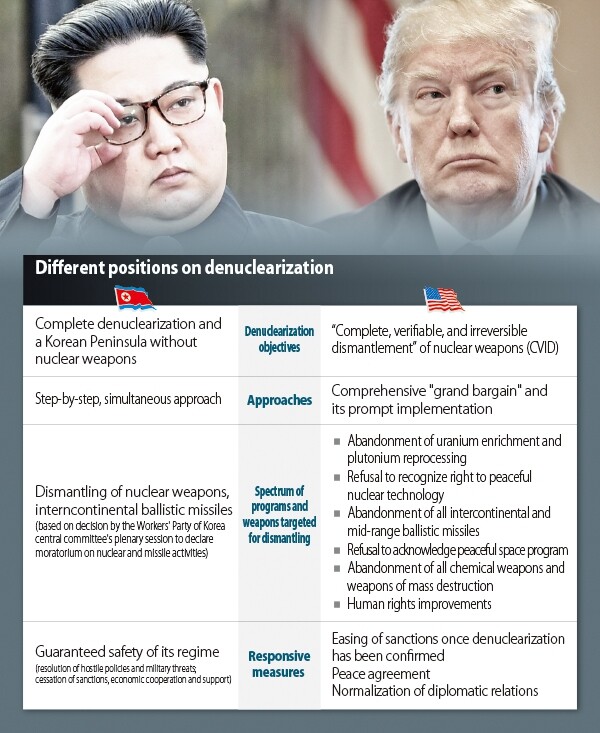hankyoreh
Links to other country sites 다른 나라 사이트 링크
US Trump administration rejects North Korea’s step-by-step approach to denuclearization

Key foreign affairs and national security officials in the Donald Trump administration stressed the importance of broad-ranging North Korean denuclearization without “rewards” ahead of a planned North Korea-US summit. US Secretary of State Mike Pompeo took aim with remarks made while flying to Pyongyang on May 8, and White House National Security Advisor John Bolton made similar comments at the White House shortly after Trump’s announcement of the US’s withdrawal from the Iran nuclear deal the same day.
Both rejected the “step-by-step, simultaneous” approach reiterated by Kim Jong-un the day before in a summit with Beijing.
“We are not going to head back down the path that we headed down before. We’re not going to relieve sanctions until such time as we achieved our objectives,” Pompeo said. The message is that the US will not be offering rewards for incremental measures prior to achieving the goal of North Korea’s denuclearization. With observers speculating his Pyongyang trip was meant for final coordination of the North Korea-US summit agenda, his remarks show Washington remains unyielding in its stance.
Pompeo repeatedly stressed the importance of “complete, verifiable, and irreversible dismantlement” of nuclear weapons (CVID), while Bolton made it clear that the US’s withdrawal from the Iran deal holds significance for North Korea.
“The withdrawal that was announced today [. . .] will have implications not simply for Iran, but for the forthcoming meeting with Kim Jong-un of North Korea. It sends a very clear signal that the United States will not accept inadequate deals,” Bolton said – implying that the US plans to eliminate areas identified as problems with the Iran deal in its negotiations with Pyongyang.
Since his presidential run, Trump has consistently denounced the Iran agreement as “terrible,” taking particular issue with “sunset clauses” limiting restrictions on Iran’s nuclear capabilities to 10 to 15 years. Regarding problems with the Iran deal, Washington has pointed to the absence of terms regarding ballistic missiles, the inability to verify the use of Iran’s nuclear program for peaceful purposes, and restrictions on military base inspections.
The US hinted that future nuclear materials may be included in the scope of North Korea’s denuclearization in addition to past and present materials.
“What we’re asking for [. . .] in part rests on what North Korea itself agreed to going back to the 1992 joint North-South denuclearization declaration: the elimination of both the front and the back end of the nuclear fuel cycle; no uranium enrichment; no plutonium reprocessing,” Bolton stressed.
Denuclearization terms in past declarations as part of “inadequate deal”
In their denuclearization declaration, South and North Korea agreed not to test, manufacture, produce, acquire, possess, store, distribute, or use nuclear weapons or to possess facilities for nuclear fuel reprocessing and uranium enrichment. Bolton has previously insisted on North Korea’s complete and permanent abandonment of weapons of mass destruction, including all programs related to nuclear weapons, ballistic missiles, and biochemical weapons.
The joint denuclearization declaration does recognize the right to peaceful use of nuclear capabilities. It remains uncertain whether Bolton will agree to this. In the Six-Party Talks that led to the September 19 Joint Statement of the 2005, the US pushed to refuse recognition of North Korea’s peaceful use of nuclear capabilities, but backed down after running into objections. Washington may regard that agreement as being “inadequate.”
The US’s view of “the path that we headed down before” as being an “inadequate deal” appears to signal its commitment to starting over from before in establishing a deal with Pyongyang – regarding past agreements as failures and achieving something new.
“The Secretary is very mindful about not repeating the mistakes of the past,” a senior State Department official said.
“And this will require a new and bold approach,” the official added. “Anything less would be to repeat the mistakes of the past.”
For North Korea’s part, this means facing far more complex demands from the US than before.
By Yoo Kang-moon, senior staff writer
Please direct comments or questions to [english@hani.co.kr]

Editorial・opinion
![[Column] Has Korea, too, crossed the Rubicon on China? [Column] Has Korea, too, crossed the Rubicon on China?](https://flexible.img.hani.co.kr/flexible/normal/500/300/imgdb/original/2024/0419/9317135153409185.jpg) [Column] Has Korea, too, crossed the Rubicon on China?
[Column] Has Korea, too, crossed the Rubicon on China?![[Correspondent’s column] In Japan’s alliance with US, echoes of its past alliances with UK [Correspondent’s column] In Japan’s alliance with US, echoes of its past alliances with UK](https://flexible.img.hani.co.kr/flexible/normal/500/300/imgdb/original/2024/0419/2317135166563519.jpg) [Correspondent’s column] In Japan’s alliance with US, echoes of its past alliances with UK
[Correspondent’s column] In Japan’s alliance with US, echoes of its past alliances with UK- [Editorial] Does Yoon think the Korean public is wrong?
- [Editorial] As it bolsters its alliance with US, Japan must be accountable for past
- [Guest essay] Amending the Constitution is Yoon’s key to leaving office in public’s good graces
- [Editorial] 10 years on, lessons of Sewol tragedy must never be forgotten
- [Column] A death blow to Korea’s prosecutor politics
- [Correspondent’s column] The US and the end of Japanese pacifism
- [Guest essay] How Korea turned its trainee doctors into monsters
- [Guest essay] As someone who helped forge Seoul-Moscow ties, their status today troubles me
Most viewed articles
- 1[Column] The clock is ticking for Korea’s first lady
- 2Samsung barricades office as unionized workers strike for better conditions
- 3S. Korea, Japan reaffirm commitment to strengthening trilateral ties with US
- 4[News analysis] After elections, prosecutorial reform will likely make legislative agenda
- 5[Editorial] When the choice is kids or career, Korea will never overcome birth rate woes
- 6Japan officially says compensation of Korean forced laborers isn’t its responsibility
- 7[Editorial] As it bolsters its alliance with US, Japan must be accountable for past
- 8Why Israel isn’t hitting Iran with immediate retaliation
- 9[Column] Has Korea, too, crossed the Rubicon on China?
- 10All eyes on Xiaomi after it pulls off EV that Apple couldn’t